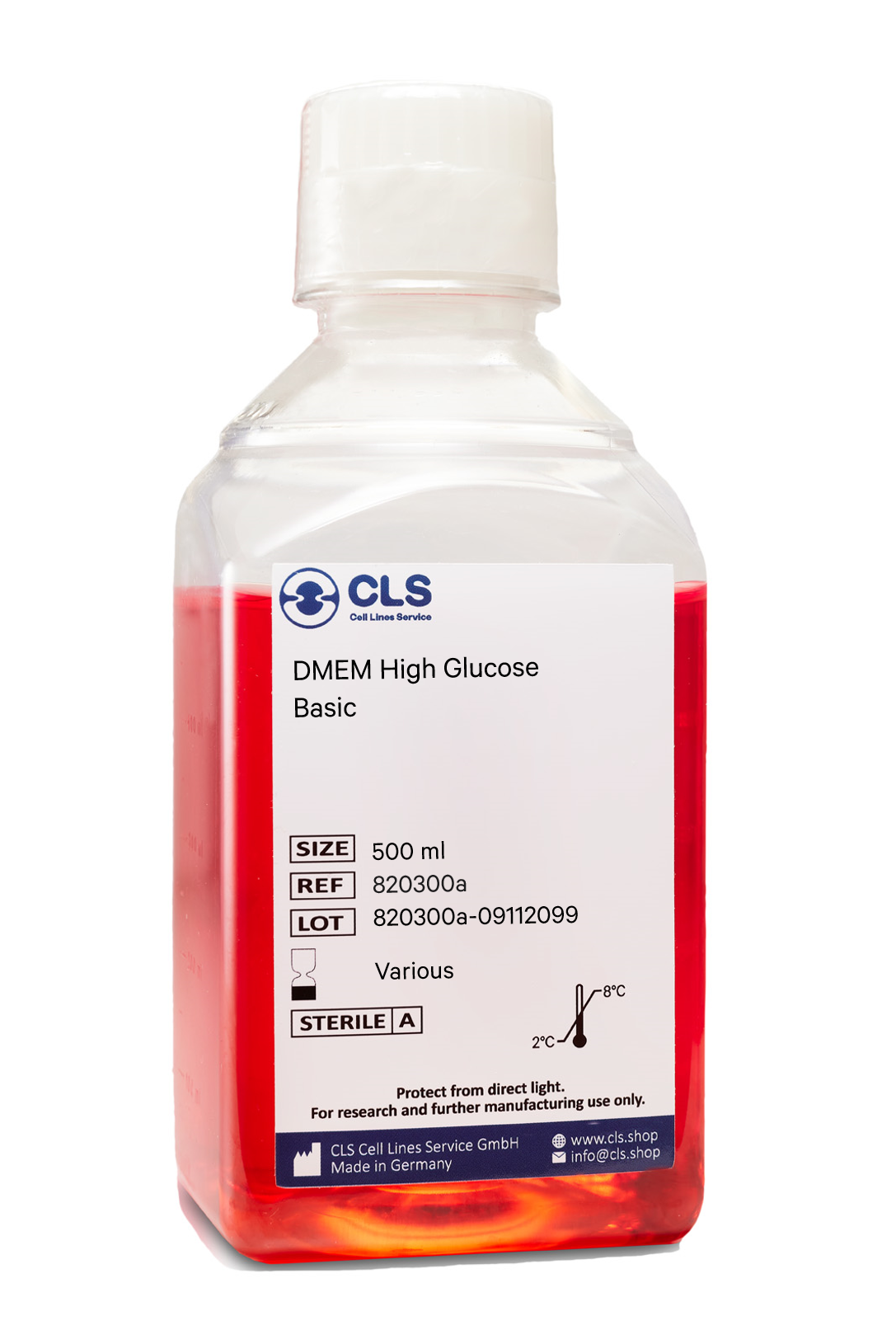DMEM, w: 4.5 g/L Glucose, w: 4 mM L-Glutamine, w: 1.5 g/L NaHCO3, w: 1.0 mM Sodium pyruvate
DMEM (Dulbecco's Modified Eagle Medium) is a highly versatile and widely utilized basal medium designed to support the growth of a diverse range of mammalian cells in biological research. It serves as an ideal medium for culturing primary fibroblasts, neurons, glial cells, HUVECs, smooth muscle cells, as well as popular cell lines like HeLa, 293, Cos-7, and PC-12.
What sets DMEM apart from other media is its unique composition. It contains an impressive fourfold increase in amino acid and vitamin concentration compared to the original Eagle's Minimal Essential Medium. Initially developed with low glucose (1 g/L) and sodium pyruvate, DMEM is frequently employed with higher glucose levels, either with or without sodium pyruvate. Notably, DMEM does not contain proteins, lipids, or growth factors, necessitating supplementation. To achieve optimal growth, a common approach is to supplement DMEM with 10% Fetal Bovine Serum (FBS). Additionally, DMEM employs a sodium bicarbonate buffer system (3.7 g/L), requiring a 5-10% CO2 environment to maintain a physiological pH.
Dulbecco's Modified Eagle Medium (DMEM) is highly regarded among defined media for cell and tissue culture, catering to the growth needs of various adherent cell phenotypes. It surpasses the original Eagle's Medium, developed in the 1950s for cultivating chicken cells, through the enhanced supplementary formulation known as Dulbecco's modification. This modification significantly elevates the content of select amino acids and vitamins up to fourfold compared to the original medium.
In the field of cell culture, DMEM plays a vital role as a growth medium for different cell types, including primary cells, stem cells, and transformed cells. Researchers also employ the modified version of DMEM for a wide array of research applications, such as drug discovery, tissue engineering, and the study of cell signaling pathways.
Quality control
- pH = 7.2 +/- 0.02 at 20-25°C.
- Each lot has been tested for sterility and absence of mycoplasma and bacteria.
Maintenance
- Keep refrigerated at +2°C to +8°C in the dark. Freezing and warming up to +37° C minimize the quality of the product.
- Do not heat the medium to more than 37° C or use uncontrollable sources of heat (e.g., microwave appliances).
- If only a part of the medium is to be used, remove this amount from the bottle and warm it up at room temperature.
- Shelf life for any medium except for the basic medium is 8 weeks from the date of manufacture.
Composition
| Components | mg/L | |
| Inorganic Salts | Calcium chloride anhydrous | 200,00 |
| Iron (III) nitrate x 9H2O | 0,10 | |
| Magnesium sulfate anhydrous | 97,66 | |
| Potassium chloride | 400,00 | |
| Sodium chloride | 6.400,00 | |
| Sodium dihydrogen phosphate anhydrous |
108,69 | |
| Other Components | D(+)-Glucose anhydrous | 4.500,00 |
| Sodium pyruvate | 110,00 | |
| Phenol red | 15,00 | |
| NaHCO3 | 1.500,00 | |
| Amino acids | L-Arginine x HCl | 84,00 |
| L-Cystine x 2HCl | 62,58 | |
| L-Glutamine | 584,00 | |
| Glycine | 30,00 | |
| L-Histidine x HCl x H2O | 42,00 | |
| L-Isoleucine | 104,80 | |
| L-Leucine | 104,80 | |
| L-Lysine x HCl | 146,20 | |
| L-Methionine | 30,00 | |
| L-Phenylalanine | 66,00 | |
| L-Serine | 42,00 | |
| L-Threonine | 95,20 | |
| L-Tryptophan | 16,00 | |
| L-Tyrosine x Na | 103,79 | |
| L-Valine | 93,60 | |
| Vitamins | D-Calcium pantothenate | 4,00 |
| Choline chloride | 4,00 | |
| Folic acid | 4,00 | |
| myo-Inositol | 7,00 | |
| Nicotinamide | 4,00 | |
| Pyridoxine x HCl | 4,00 | |
| Riboflavin | 0,40 | |
| Thiamine x HCl | 4,00 |

